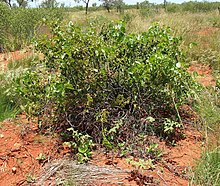Ipomoea costata
| Ipomoea costata | |
|---|---|

| |
| Scientific classification | |
| Kingdom: | Plantae |
| Clade: | Tracheophytes |
| Clade: | Angiosperms |
| Clade: | Eudicots |
| Clade: | Asterids |
| Order: | Solanales |
| Family: | Convolvulaceae |
| Genus: | Ipomoea |
| Species: | I. costata
|
| Binomial name | |
| Ipomoea costata | |
Ipomoea costata, commonly known as rock morning glory, is an Australian native plant.[2] It is found in northern Australia, from Western Australia, through the Northern Territory, to Queensland.[3] Its tubers provide a form of bush tucker to some Aboriginal peoples, known as bush potato,[4] or (to the Ngururrpa groups in WA), karnti.[5]
Description
[edit]It is a prostrate or climbing perennial growing up to 3 m high, with purple-blue-pink flowers from February to November.[2] Juvenile form is a vine, maturing into a woody-stemmed shrub with vine-like stems. Leaves are broad and leathery, 4-9 cm long.[4] Tubers are rounded, 12-20 cm long by 5-18 cm wide, with a single plant potentially having up to twenty tubers.[6]
Habitat
[edit]It occurs on sandy or rocky soils, often over limestone,[2] and on spinifex sand plains in northern Australia.[4]
Uses
[edit]It is the source of bush potato, a bush tucker food for Aboriginal people.[4] Bush potatoes are cooked on the warm earth under coals, and are peeled when cooked.[6]
Aboriginal names
[edit]In Central Australia, I. costata is also known to Aboriginal people by the following names:[7]
- Alyawarr: anaty
- Anmatyerr: anaty or anek
- Eastern Arrernte: anatye
- Western Arrernte: natye
- Pintupi: ala or yala
- Warlpiri: karnti or paparda
References
[edit]- ^ "Ipomoea costata". Australian Plant Census. Retrieved 16 February 2021.
- ^ a b c Grazyna Paczkowska (8 November 1996). "Ipomoea costata Benth. Rock Morning Glory". FloraBase. Western Australian Herbarium. Retrieved 16 February 2021.
- ^ "Occurrence records". The Australasian Virtual Herbarium (AVH). Atlas of Living Australia. Retrieved 16 February 2021.
- ^ a b c d Low, Tim (1991). Wild Food Plants of Australia. Angus & Robertson. p. 163. ISBN 0207169306.
- ^ "New Ngururrpa Indigenous Protected Area". Country Needs People. 1 August 2018. Retrieved 14 May 2021.
- ^ a b Isaacs, Jennifer (1991). Bush Food: Aboriginal food and herbal medicine. Ure Smith Press. p. 94. ISBN 0725408340.
- ^ Vincent, Ange (July 2009). "Australian Bush Foods Information Sheet 6: Bush Potato Ipomoea costata & I polpha" (PDF). Desert Knowledge CRC. Archived from the original (PDF) on 24 March 2020. Retrieved 18 March 2020.
External links
[edit]
